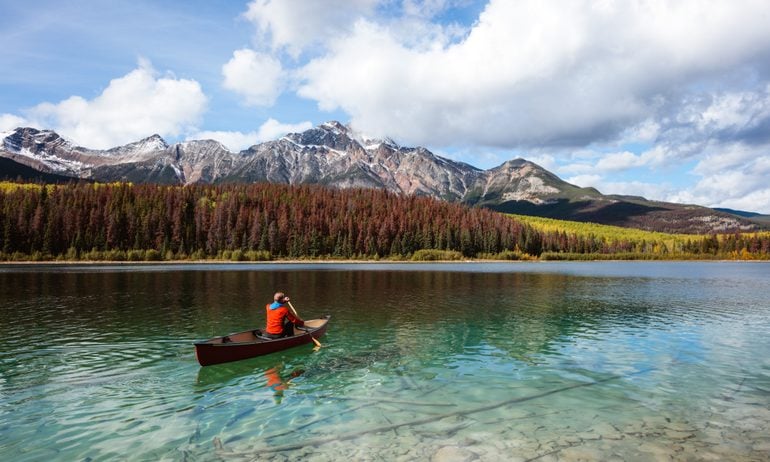Can Americans Travel to Canada?
Canada is open to visitors without COVID-related restrictions in place.

Many or all of the products on this page are from partners who compensate us when you click to or take an action on their website, but this does not influence our evaluations or ratings. Our opinions are our own.
Editor's note: Effective Oct. 1, 2022 all previous border measures to enter Canada have ended.
Traveling in the COVID era comes with all sorts of questions, logistics and concerns that travelers didn't think about before 2020. Traveling to Canada, despite its proximity to the U.S., has been no different.
In March 2020, the U.S. and Canada both closed their land borders to nonessential travel due to COVID-19. What started as a monthlong closure was extended 18 times.
So, if you gave up following the news or tracking border rules, you might be wondering: Can Americans travel to Canada? As of Oct. 1, the answer is yes, with no COVID-related restrictions.
Here's what Americans need to know about traveling to Canada.
What do Americans need to enter Canada?
As a U.S. citizen, you will need to provide proof of citizenship and identity to enter Canada. This can include a U.S. passport, passport card or a NEXUS card. No visa is required as long as your stay is under 180 days.
While the border between the U.S. and Canada reopened for nonessential travel in both directions in November 2021, several COVID-related protocols remained in place for entry until October 2022. Those rules have now been lifted.
Do you need to be vaccinated to enter Canada?
According to the Canadian government travel website, vaccination is no longer required to enter the country.
Previous policies including mandatory use of the ArriveCAN app, proof of vaccination, pre- or on-arrival testing, quarantine and health checks have also been lifted.
» Learn more: How to travel to Toronto on points and miles
Do you have to wear a mask on a plane to Canada?
In mid-2022, many Americans may have been surprised to find that they were required to wear a mask on all flights to and from Canada (flights throughout the U.S. had lifted that restriction). However, as part of the Oct. 1 policy changes, masks are no longer required on planes or trains in Canada.
Can unvaccinated people travel to Canada?
As of Oct. 1, 2022, you can travel to Canada unvaccinated as travel restrictions have been lifted.
» Learn more: TSA PreCheck or Global Entry — Which is right for you?
If you’re planning to travel to Canada
Travel to Canada is back to pre-pandemic rules which simply require U.S. citizens to provide valid proof of citizenship and identification using a passport, passport card or NEXUS card for stays under 180 days. Standard customs and immigration paperwork will still be required, as has always been the case for travel into Canada.
How to maximize your rewards
You want a travel credit card that prioritizes what’s important to you. Here are some of the best travel credit cards of 2025:
Flexibility, point transfers and a large bonus: Chase Sapphire Preferred® Card
No annual fee: Wells Fargo Autograph® Card
Flat-rate travel rewards: Capital One Venture Rewards Credit Card
Bonus travel rewards and high-end perks: Chase Sapphire Reserve®
Luxury perks: The Platinum Card® from American Express
Business travelers: Ink Business Preferred® Credit Card
Capital One Venture X Rewards Credit Card
Travel
Hotel
With a big sign-up bonus, travel credits, high rewards and airport lounge access, this card could be well worth its annual fee — which is lower than many competitors.


